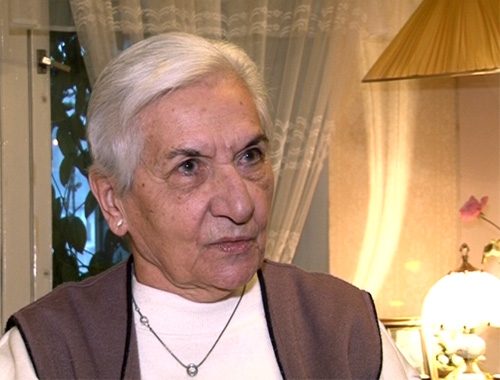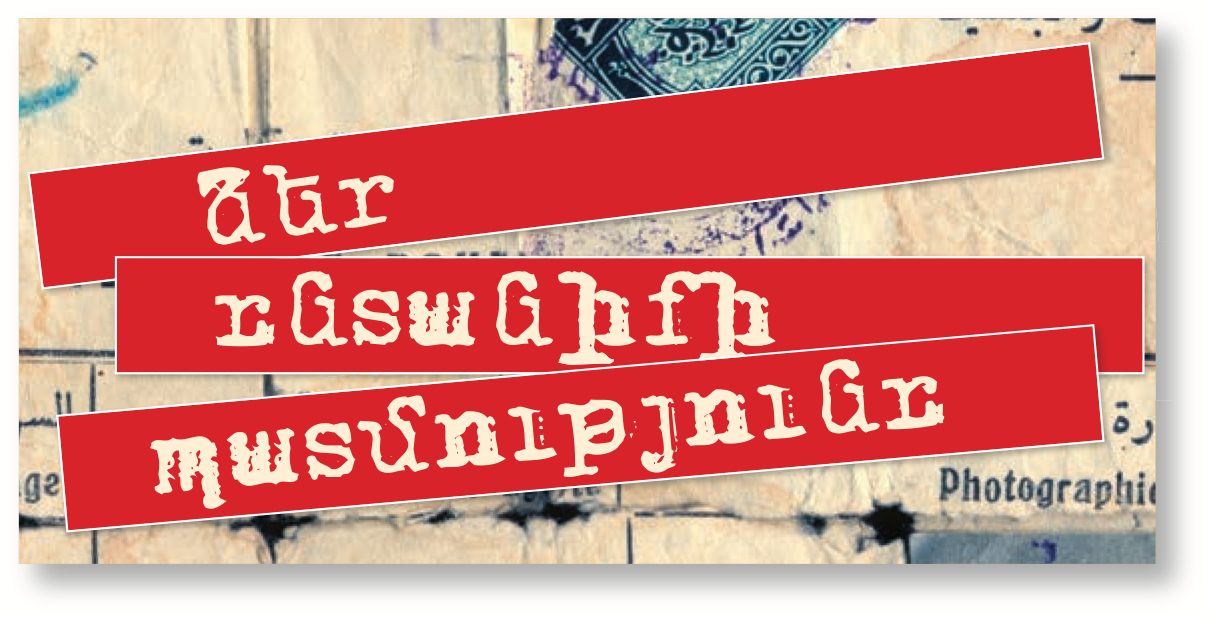 Repatriated from Aleppo, 1946 / Resides in Yerevan
Repatriated from Aleppo, 1946 / Resides in Yerevan
Anahit Poghikyan
The Second World War had just ended and news arrived that Moscow had permitted the repatriation of Armenians. In Aleppo, where there were about 500,000 Armenians, the people were in a state of confusion. Everyone was petitioning to go. Preparations lasted for six-seven months. During this time, delegations arrived one after the other, talking about Armenia. They were telling the people to go, that life was very good there.
One of the local Armenian political parties began to say things in opposition – ‘Now isn’t the time. Don’t rush. The homeland has just exited the war and conditions are difficult’. But no one listened and by April 1946 families started to receive permission to go. They would collect their belongings and prepare to leave. There were ‘homeland farewell’ parties in people’s homes; also at weddings. The caravans started leaving in June.
I was one of those crazy people who said I will go to the homeland. My health even suffered. My mother took me to a doctor, an acquaintance. He said, ‘the girl is OK, she’s just in love with Armenia’. My wealthy aunts, living in Egypt, would write, ‘Brother, don’t rush’. The next year, my aunt, the millionaire Satenig Yerjanian, who had no children, came to Aleppo and told me, ‘My girl, graduate college, and then go’. I was attending the American College, and my brother was studying at Melkonian High School in Cyprus.
(My mother was born in Erzeroum and my father was from Kharpert. I was born in the Alexandretta Sanjak. We lived there for seven years and moved to Aleppo in 1939.)
One day, I and my girlfriend went to the famous Baron Hotel. That's where the delegates were. We asked them to 'pull our number' so that we too could go to Armenia. When he found out that I hadn't graduated from college, the delegate said, ‘My dear girl, it would be best if you first graduated’. My answer was, no. I requested to go and so did my friend.
Our number was picked in August; permission for us to leave for Armenia. We sent a telegram to Melkonian High School so that my brother could join us. In the second half of August, we left Aleppo with my parents and grandma on the seventh caravan. I was eighteen at the time, my brother was seventeen, and my sister, eight.
In 1946, just seven caravans from Syria and Lebanon went to Armenia. From Aleppo, the caravans left from Lebanon, from Beirut by boat, and arriving at Batum. The large ship Rosya came to take us. The ship was transporting booty from Germany. I believe 7,000 people boarded the ship.
Approaching Batum, they told us to throw all our food overboard. The ship stopped. We had to wait a long time to disembark. I don’t know how long we waited. It was September. Sntrian, the famous guy from Melkonian, organized a choir on the ship. We sang and danced to pass the time.
Our turn came and we disembarked. Rain. There were no houses, just tents all around. As in Beirut, we were quarantined. Mud, rain, and we had all that baggage. No problem, we were going to the homeland. We handed over our belongings, trunks and beds, to the train baggage cars. We sat inside. Entering Armenia, the wagons were separated. One to Leninakan, the other to Kirovakan…They took us to Yerevan. We saw Ararat. We all knelt and kissed the ground.
At the Yerevan train station, they left us under --- մեզ ծածկի տակ թողեցին՝ ------. They told us to wait. ‘We will take you to Kotayk region, it’s not far’. My mother said, ‘I took my girl out of college and my son from Melkonian. We have come to Armenia so that they can continue their education.’ They didn’t listen. They brought a cargo truck, took what we were carrying and loaded it up, and drove off. We reached a village. Whether they were the village authorities or not, the driver told them, ‘We have brought some repatriates’. The villagers replied that there wasn’t any space. Finally, they agreed. ‘There’s a barn here where they can stay’. So they removed all the sheep and lambs so we could stay there. My mother couldn’t take it. ‘What are you doing? I agreed to come, even to live in one room, and you are giving us this dirty sheep place?’ One of the guys told her to grab her belongings and to go to another place.
It was October; a very cold year. They gave me, my mother, sister and grandma, a small bedroom. My father and brother got a separate place. One night, I heard this noise – ‘they took it, they stole it’. We went and saw that they had stolen my father’s large suitcase. All our valuables were inside. I was fed-up and dropped to my knees – ‘Homeland, is this what you were?’
Our relatives finally arrived. They located us and took us to their home. They were a big family but we somehow moved in their small house. Their son had returned from the war wounded.
On day, my mom went to the immigration committee and asked that the family be allowed to move to Yerevan so that we children could go to school. One of the officials there told here – yes agha, dou agha, ba mer jaghatsn ov agha? (Loosely translated - I’m an agha, you’re an agha. But who will work the mill?)
We didn’t want anything else in the homeland; just to continue our education. Then, a woman who had immigrated from America years ago, showed up. She was a very pleasant woman, Mrs. Bedrosian, an English teacher. She told us that there was this foreign and Russian language institute, and that we should apply there. They would accept us, she said.
The next day, I went with my brother to the institute. There was an elderly secretary there, an old repatriate, who started to speak English with us. She said that we spoke beautiful Armenian and English, and that she would help us get accepted. We both wrote wonderful essays. They accepted us and we started to forget the bad times. Well, we were young…
We lived in the Arabkir neighborhood of Yerevan; where the American University is today. There were small houses around at the time. We had rented a room there. The owner lived upstairs. The room we rented was next to the basement. They gave my father a job. He was a goods specialist. He knew Turkish, French and English. In Syria, when the ships docked, he accepted the cargo. Where the Armenia Hotel is now, there used to be a large gastronome store. They appointed him the inspector. He didn’t know Russian and had no trade.
Slowly, we got settled in. They gave us a loan and we built a house. We started to advance and patiently withstood all the hardships. We worked and completed the institute. I graduated with honors. By that time, I had married.
The exile? Luckily, the exile bypassed us. My husband arrived in Armenia a year later than us. We were supporters of the Hnchak Party and his family were communists. People who were Tashnags were told to leave the party before coming to Armenia. They were told that if they did, they wouldn’t be bothered in Armenia. There were many families who did just that, but they were rounded up in 1949 and exiled.
We learnt about the homeland during wartime. There was Soviet Armenia and it was victorious. Here, when I would say that we lived pretty good there. Locals would respond, ‘If it was so good, you should have stayed. Why did you come?’ I would reply that we came because it was the homeland. ‘What homeland? Where there’s food is where you should be’, was their retort. You know what? Patriotism is an amazing thing. If an Armenian is born far from the homeland, they love the homeland like crazy.
We would stand in line, with a voucher, for a piece of black bread. Some of our lads couldn’t take it and tried to flee across the border. I was an optimist. Never mind, it’s the homeland. It just exited the war. There are no men; they died. At least we should help by working. Many skilled craftsmen arrived. They helped out. I received a higher education. My husband remained a tradesman. He would ask, ‘Must someone keep us, or not?’ But the government started to discriminate and did many wrong things.
The part about going back started much later. Who would dare to say such things? Those who tried were caught. Those who spoke about it were caught.
Let me say one thing now. I am one of the lucky ones who has lived a long time and has seen the present. We have no road back. We are intelligent today and independent Armenia must survive. I had a somewhat conceited brother-in-law who married the daughter of a wealthy family. He was one of the first who wanted to go and he went. The boy was well-known in sports here. We went a few years later, just to see what’s what.․․․․․
We Armenians always get it wrong. We regret what we’ve done and try to correct our mistakes. Now, we no longer have the right to get it wrong. We are a pretty well-known people. Who knew us in the past? Now, however, it’s as if the whole world is constantly saying Armenia, Armenia….



















